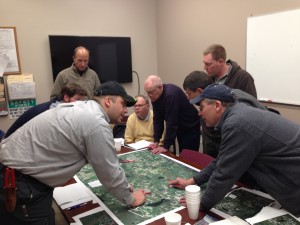How do you define a farmer-led watershed council? It’s simple really. You need these three things:
- An identified, shared, water, soil, or other natural resource concern
- A group of farmers organized within a defined watershed and willing to play a leading role in addressing the shared concern(s)
- A vision for change, ideas of how to get there, and lots and lots of meetings and activities
Maybe it’s not so simple. There isn’t actually a standard definition for a farmer-led council, but it’s a question that’s been coming up a lot with the announcement of a new source of state funding soon to be available from Wisconsin’s agriculture department.
In many ways, we’ve spent the last 2+ years trying to figure out what defines a farmer-led council, and what makes it successful. Our project developed out of a very immediate need to address phosphorus pollution in the St. Croix and Red Cedar River Basins (both EPA designated “impaired” water bodies) and using the very successful Hewitt Creek Watershed project as a model. In that model, the farmer council uses relatively small incentive payments to encourage farmers to try new practices and reduce nutrient and sediment runoff. They have a strong focus on performance — meaning they track and reward reductions and farmer participation.
We, too, use incentives to help farmers try new things, but what we’re finding is that for most farmers, money isn’t really what makes the difference. Instead, it’s information. Being inspired by a neighbor, learning at a field day, or trying something out together through on-farm research has gotten much more interest where we work. For that reason, we try to do as many field days and other learning opportunities as we can, and are always looking for ways to help farmers share information with each other.
With strong farmer-leadership and an engaged community, including local government units and non-profit groups, farmer-led councils can be very powerful forces for change.




